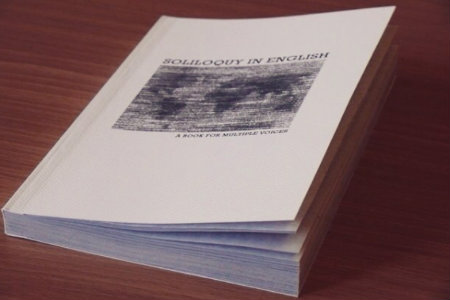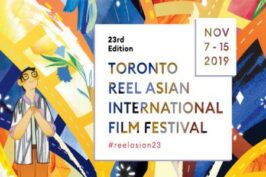Vancouver-based artist Patrick Blenkarn is inviting us to examine English as a language in his SummerWorks performance piece, Soliloquy in English. This piece is Blenkarn’s attempt to pull this lingua franca back upon itself, to get us talking about how we are talking, and wonder at what it means to share this language today.
Soliloquy in English is an immersive, interactive experience in which we, as audience members, will take turns reading from a book out loud, to bring to life a collage of stories and experiences about learning and living in English. Being someone who learned English as a second-language, I wanted to learn more about Blenkarn’s premise for this performance piece, as well as his thoughts on the language itself. Here are his very thoughtful responses.
HM: How did the idea for this immersive performance come about?
PB: This performance has many origins: an interest in English as a global language; an interest in the act of reading in performance; a lack of actors; and more.
One version of its story might go something like this:
In 2015, I moved to Shanghai accompanying a group of teachers. My partner was one of them and, in order to go along, I became certified to teach as well. While there, I began to think more and more my relationship to the language I was teaching. I also started to make notes about which languages I was seeing in art, not just art in China, but from everywhere. I was thinking about language (native-speaking or not) as a material and a choice in one’s work.
At the same time, or perhaps shortly after, I encountered a number of artworks that incorporated the reading of texts on stage (in English) that didn’t quite do it for me. They fell short I think because, after my time in Shanghai, they never seemed particularly interested in the relationship between the act of reading (and speaking) and what they were saying. I wanted to find a way to link the act of reading with the words and language being read—and later, even connect these with the material the words are being read off of.
Somewhere along the way I started asking groups of people to share in reading a book in the same way we share in speaking the same language. Passing it from person to person—hand to hand and voice to voice.
 HM:Is the book the audience member will read aloud your own creation?
HM:Is the book the audience member will read aloud your own creation?
PB: The book itself is made by me. Quite literally. I made the paper from an Oxford dictionary by blending it down and turning it back into paper. But the words we read are not mine. They are transcribed from interviews with people who learned English as a second language, people who I have, despite our history, known in just this one language—friends, family, teachers, and coworkers.
HM: I’m curious about the idea to discuss a lingua franca. Could you expand on your views on the English language and what it means to you in the context of this piece?
PB: My views on English are of course my own. I am an Anglophone from Ottawa, a ‘native speaker’. I did not fight to beat the TOEFL exam. What’s more, the people I interviewed do not represent every possible background an English speaker could have. That would be a very long book.
But I will say two brief things about my perspective on English as a lingua franca today:
1) To me, there’s nothing wrong with a lingua franca. I’m not out to vilify them. There are many lingua francas in the world today: Mandarin Chinese is a lingua franca in China; French functions as a lingua franca across many nations and states, as does Spanish and Standard Arabic. English is an anomaly simply because we’ve never seen a language used so widely, nor one so tied up (still to this day) in colonialism and capitalism.
2) One way I like to think of our relationship to English as a lingua franca is in terms of accommodation. When you are an English-speaker (native or not), you can be accommodated in your travels and interactions around the world. On the one hand, that’s great. Connections with strangers happen faster and more easily. On the other hand, this accommodation strikes me as a bit dangerous because we have come to expect that we don’t need to change ourselves when we change our place or our community. (It’s easy to find reviews of hostels in Rome, for example, in which people complain that the staff don’t speak English.) When thinking about being international citizens, I think we have to resist thinking about a fixed identity, and instead think of one that responds to where it is—and that includes not always responding in English.
I think Soliloquy in English tries to get its audience members to chew on these big ideas. It literally puts words in your mouth to help you do so. Some words will feel strange and foreign. Others will feel all too familiar. It depends on how you yourself entered the English language. And while the piece obviously uses the lingua franca of English to its own end, it doesn’t provide a clear answer. There’s no “And therefore English is evil” in its conclusion, nor a “happily ever after.”
Blenkarn’s Soliloquy in English is doing quite well at SummerWorks. It continues until Sunday, August 14th. Tickets are $15 for all performances. For further festival details, please visit summerworks.ca.






